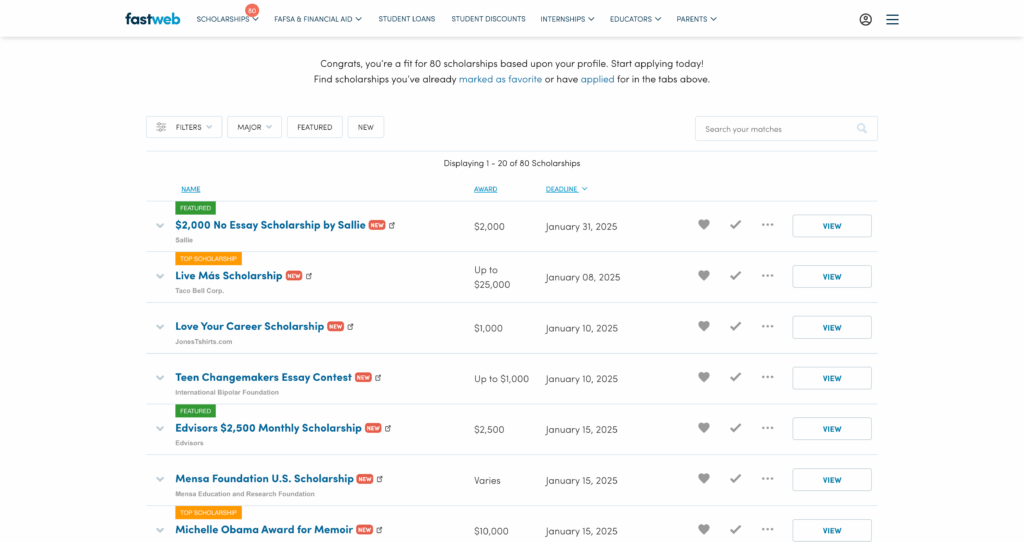Top Scholarship Databases You Should Be Using

Navigating the world of scholarships can feel like searching for a needle in a haystack. With countless options available, finding the right scholarships that align with your academic profile, interests, and financial needs is crucial. Fortunately, a plethora of online databases exist to streamline this process and connect students with valuable funding opportunities. This article unveils the top scholarship databases you should be using to maximize your chances of securing financial aid for your education. From comprehensive platforms to niche resources, we'll guide you through the best tools to help you achieve your academic dreams without breaking the bank.
Top Scholarship Databases You Should Be Using
Here's a detailed overview of top scholarship databases: Finding scholarships can feel like searching for a needle in a haystack, but the right database can significantly increase your chances of securing funding for your education. These platforms aggregate thousands of scholarships from various sources, making it easier to filter and identify opportunities that align with your academic profile, interests, and financial needs. Using multiple databases is crucial, as some scholarships may only be listed on specific platforms. Start your search early and be prepared to spend time refining your criteria and completing applications thoroughly.
Fastweb
Fastweb is a well-known and widely used scholarship database that boasts a vast collection of scholarships, grants, and internships. It allows you to create a personalized profile detailing your academic background, interests, and extracurricular activities, which the platform then uses to match you with relevant opportunities. Fastweb stands out with its email alerts, which notify you of new scholarships that fit your profile, helping you stay on top of deadlines and potential funding sources. This personalized approach saves time and increases the likelihood of finding scholarships that are a good fit.
Scholarships.com
Scholarships.com is another comprehensive database with a user-friendly interface and an extensive list of scholarships from various sources. This platform helps students by allowing users to filter scholarships based on criteria such as GPA, major, state, and ethnicity, narrowing down the search to more relevant options. A key feature of Scholarships.com is its detailed scholarship descriptions, providing clear information about eligibility requirements, award amounts, and application deadlines, making it easier to assess whether a scholarship is worth pursuing.
Chegg
Chegg, primarily known for its textbook rentals and tutoring services, also features a robust scholarship search tool. Beyond scholarships, Chegg also offers valuable resources for college planning and career advice, making it a one-stop shop for students navigating higher education. Chegg's advantage lies in its integration with other student resources, providing a seamless experience for those already using the platform for academic support. Its scholarship database is regularly updated, ensuring users have access to the latest opportunities.
Niche
Niche is unique in that it combines scholarship listings with in-depth college profiles and student reviews, offering a holistic view of educational institutions. Users can explore various colleges and universities while simultaneously searching for scholarships specific to those schools or general academic awards. Niche's strength lies in its community-driven content, providing valuable insights from current students and alumni, which can inform your college selection and scholarship application strategies.
Going Merry
Going Merry is a platform designed to simplify the scholarship application process. Its platform allows students to fill out a single profile that can then be used to apply for multiple scholarships, saving time and effort. Going Merry stands out due to its partnerships with high schools and counselors, ensuring that students have access to tailored scholarship opportunities and guidance. Its user-friendly interface and streamlined application process make it a valuable resource for students seeking financial aid.
| Database | Key Features | Pros | Cons |
|---|---|---|---|
| Fastweb | Personalized matching, Email alerts | Large database, User-friendly | Can be overwhelming with options |
| Scholarships.com | Detailed descriptions, Filter options | Comprehensive search, Easy navigation | May require extensive profile creation |
| Chegg | Integrated student resources | One-stop shop, Updated listings | Scholarship search may be secondary |
| Niche | College profiles, Student reviews | Holistic view, Community insights | Scholarship listings can be less targeted |
| Going Merry | Simplified application process, Counselor partnerships | Time-saving, Streamlined application | May have fewer scholarships than larger databases |
What is the best scholarship database?

Database Size and Scope
- The ideal database should boast a substantial number of scholarships across diverse fields of study, academic levels, and geographic locations. The more scholarships included, the higher the chance of finding a suitable match.
- It is important to consider if the database is updated regularly to maintain the accuracy of the information. Scholarships can be discontinued, eligibility criteria can change, and new scholarships are constantly being added.
- Specialized databases are also valuable. For instance, some cater specifically to minority students, women in STEM, or students pursuing specific career paths. These niche databases can lead to more targeted and relevant results.
User-Friendliness and Search Functionality
- A user-friendly interface is crucial for efficient searching. The database should have a clean, intuitive design that's easy to navigate.
- Advanced search filters are essential. These filters should allow you to narrow down your search based on criteria such as GPA, major, ethnicity, state of residence, and other relevant factors.
- Consider whether the database offers personalized matching. This feature uses your profile information to recommend scholarships that are a good fit for your qualifications and interests.
Information Accuracy and Reliability
- The accuracy of scholarship details is paramount. The database should strive to provide up-to-date information on eligibility requirements, deadlines, award amounts, and application procedures.
- Ideally, the database should verify the legitimacy of scholarships to avoid scams or fraudulent offers. Reputable databases often have a process for vetting the scholarships they list.
- Check for disclaimers regarding third-party websites. Many databases link to external scholarship applications, so it's crucial to be aware of the database's limitations in ensuring the accuracy of information on those external sites.
Additional Resources and Features
- The best databases offer additional resources beyond just a list of scholarships. This can include articles on scholarship application tips, essay writing guides, and advice on financial aid.
- Some databases offer tools for tracking application deadlines or managing your scholarship search process. These features can be helpful for staying organized and on top of your applications.
- Community forums or Q&A sections can provide valuable insights and support from other scholarship seekers. Sharing experiences and asking questions can be beneficial during the application process.
Cost and Access
- A good scholarship database should be free to use or offer a free trial. Many reputable databases are supported by advertising or institutional partnerships.
- Be wary of databases that require you to pay a fee for access to scholarship information. Legitimate scholarship opportunities are typically available without cost.
- Consider the accessibility of the database. Can you easily access it from various devices (computer, tablet, smartphone)? Is it compatible with screen readers or other assistive technologies?
What is a good source for scholarship information?

University Financial Aid Offices
- Direct contact with your college or university's financial aid office is paramount. These offices possess intimate knowledge of institutional scholarships, grants, and external funding opportunities relevant to their students.
- They often host workshops and provide personalized advising to guide students through the application process. They're your primary point of contact for understanding available aid specific to your chosen institution.
- Leverage their expertise to understand the nuances of your university's scholarship programs and maximize your chances of securing financial assistance.
Reputable Scholarship Search Websites
- Websites like Scholarships.com, Fastweb, and Niche are valuable resources for searching through a vast database of scholarships. These platforms allow you to filter scholarships based on your academic profile, interests, and demographic information.
- These sites aggregate scholarship information from various sources, providing a centralized location for your scholarship search. Carefully review the eligibility requirements and application deadlines for each scholarship.
- Utilize their filtering tools to narrow down your search and find scholarships that align with your qualifications.
Professional Organizations and Associations
- Many professional organizations and associations offer scholarships to students pursuing degrees in their respective fields. For example, the American Medical Association (AMA) offers scholarships to medical students.
- Research organizations related to your chosen major or career path to discover specific scholarship opportunities. These scholarships often have stricter eligibility criteria related to academic performance or career goals.
- These organizations often provide mentorship and networking opportunities alongside financial assistance.
Government Agencies
- Government agencies, such as the U.S. Department of Education, offer various grant and scholarship programs to students. Explore federal and state aid options to supplement your scholarship search.
- The Free Application for Federal Student Aid (FAFSA) is a crucial first step to determine your eligibility for federal student aid. Ensure you complete the FAFSA accurately and on time.
- Investigate state-specific scholarship programs offered by your state's department of education.
Community Organizations and Local Businesses
- Many community organizations, such as local Rotary Clubs or religious institutions, offer scholarships to students in their area. These scholarships often focus on supporting students with ties to the community.
- Local businesses may also sponsor scholarships for students pursuing specific degrees or attending local schools. Research opportunities within your local community.
- These scholarships can be less competitive than national scholarships, increasing your chances of success.
What is the best website to find fully funded scholarships?

Scholarships.com: A Comprehensive Starting Point
Scholarships.com stands out as a robust platform for scholarship seekers. Its expansive database encompasses a wide array of opportunities, catering to diverse academic disciplines, nationalities, and educational levels. While it may not exclusively list fully funded scholarships, it provides the necessary tools to filter and identify opportunities that align with individual profiles, including options that offer comprehensive financial coverage. It's important to thoroughly review each scholarship description to ascertain the level of funding provided.
- Wide Variety: Access to a large number of scholarships.
- Search Filters: Tools to refine your search based on criteria such as field of study, GPA, and location.
- Regular Updates: The database is frequently updated with new opportunities.
Fastweb: Personalized Matching and Financial Aid Resources
Fastweb is another popular choice, known for its personalized matching system. Users create profiles detailing their academic background, interests, and financial needs. Fastweb then generates a list of scholarships that closely match the individual profile. While the focus isn't solely on fully funded scholarships, the personalized approach helps streamline the search process and may uncover relevant opportunities that offer significant financial assistance. The personalized matching significantly reduces the time spent searching.
- Profile-Based Matching: Scholarships tailored to your specific background.
- Financial Aid Information: Resources beyond just scholarships.
- Mobile App: Convenient access on the go.
InternationalScholarships.com: Global Opportunities for International Students
InternationalScholarships.com is specifically geared towards international students seeking financial aid to study abroad. The website offers a directory of scholarships, grants, and financial aid opportunities available to students from around the world. While not all opportunities are fully funded, it is a valuable resource for international students looking to cover tuition, living expenses, and other related costs. This site focuses exclusively on opportunities for international students.
- International Focus: Scholarships specifically for studying outside your home country.
- Country-Specific Search: Refine your search by country of origin and destination.
- Financial Aid Articles: Information on visas, insurance, and other international student topics.
Scholarship America: Community and Corporate Scholarships
Scholarship America focuses on connecting students with local community scholarships and corporate-sponsored programs. These scholarships often provide substantial funding and may even be fully funded in some cases. The website provides access to a wide range of unique scholarship opportunities often supported by companies and local community organizations. Local and corporate sponsorships can mean less competition.
- Community Focus: Scholarships offered by local organizations.
- Corporate Sponsors: Opportunities funded by businesses.
- Direct Applications: Streamlined application processes for many scholarships.
Government Websites and University Financial Aid Pages: Direct and Reliable Sources
Often overlooked, government websites (both national and local) and the financial aid pages of universities themselves are crucial resources for finding fully funded scholarships. Many governments and universities offer generous scholarship programs to attract talented students. These sources often provide the most reliable and comprehensive information about eligibility criteria and application procedures. Directly check university websites for their institutional scholarships.
- Official Information: Accurate and up-to-date details.
- University Specific Programs: Scholarships exclusively for students at that institution.
- Government Initiatives: Access to national and regional funding opportunities.
Who is the best reference for scholarships?

Academic Professors and Teachers
Academic professors and teachers are often excellent references, particularly if the scholarship is related to your field of study. They can speak to your academic abilities, work ethic, critical thinking skills, and potential for success in your chosen field. Furthermore, they are accustomed to writing letters of recommendation and understand what scholarship committees are looking for.
- Focus on professors who taught you in courses related to the scholarship's focus.
- Provide them with your resume, transcript, and a personal statement outlining your goals.
- Ask them well in advance of the deadline, giving them ample time to write a thoughtful letter.
Employers and Supervisors
Employers and supervisors can provide valuable insights into your professional skills, work ethic, leadership qualities, and ability to work in a team. They can speak to your practical skills and how you apply your knowledge in a real-world setting. This can be particularly relevant for scholarships related to career development or specific industries. Their insight in how you demonstrate commitment, and your ability to achieve goals are a great asset.
- Choose supervisors who know your work well and have observed your contributions closely.
- Provide them with specific examples of your accomplishments and responsibilities in your role.
- Highlight how your work experience aligns with the scholarship's goals.
Mentors and Advisors
Mentors and advisors, whether academic or personal, can offer a holistic perspective on your character, personal growth, and aspirations. They can speak to your potential, your dedication to your goals, and your commitment to making a positive impact. Their input can be invaluable when showcasing your personal qualities and long-term vision.
- Select mentors who have guided you and understand your motivations and passions.
- Share your personal story and your reasons for seeking the scholarship with them.
- Encourage them to highlight your unique qualities and potential for future success.
Community Leaders and Volunteers
Community leaders and volunteer coordinators can attest to your commitment to service, your leadership skills, and your dedication to making a difference. Their recommendations can be particularly powerful for scholarships that value community involvement and social responsibility. Make sure they mention your dedication to a cause and any remarkable leadership roles you played while volunteering.
- Approach community leaders who have witnessed your contributions firsthand.
- Provide them with details about your volunteer activities, including your role and impact.
- Emphasize how your commitment to service aligns with the scholarship's values.
Alumni of the Scholarship or University
Alumni of the scholarship or university can offer a unique perspective and understanding of what it takes to succeed. They can speak to the specific qualities and attributes that the scholarship committee values and can provide valuable insights into the institution's culture and expectations. They are great references as they can share their experiences and highlight their qualifications.
- Connect with alumni who have similar interests or career goals.
- Share your aspirations and explain why you are a good fit for the scholarship or university.
- Ask them to highlight your potential to contribute to the community and uphold the institution's values.
Frequently asked questions
What makes a scholarship database "top"?
A "top" scholarship database typically offers a comprehensive and up-to-date listing of awards, boasting a user-friendly interface, advanced search filters that allow for personalized results, and reliable information vetted to avoid scams or misleading opportunities. They also often include features like scholarship matching and application tracking to streamline the process.
Are scholarship databases free to use?
Most reputable scholarship databases are indeed free for students to use. Be cautious of any database that requires a fee or subscription, as this could be a sign of a scam. Instead, focus on databases that are supported by advertisements, foundations, or educational institutions committed to helping students afford college.
How often should I check scholarship databases?
It's advisable to check scholarship databases regularly, ideally weekly or at least bi-weekly. New scholarships are constantly being added, and deadlines can approach quickly. Consistent monitoring increases your chances of finding new opportunities that align with your profile and academic goals, maximizing your chances of securing funding.
What information do I need to effectively use a scholarship database?
To effectively use a scholarship database, you should gather information about your academic record (GPA, test scores), your financial situation (EFC or estimated family contribution), your extracurricular activities, your intended major, and any specific demographics or backgrounds that might qualify you for niche scholarships. The more information you have prepared, the better you can filter results and find relevant opportunities.
